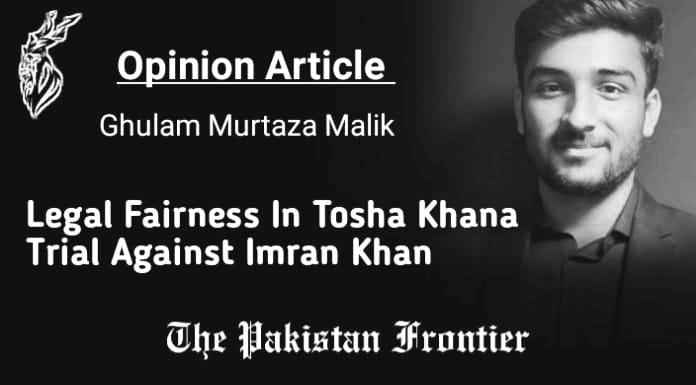A court is made up of individuals with the legal authority to decide cases of any kind while keeping the provisions of the constitution and the law in mind.
In Pakistan recently there has been a debate regarding the decision against Imran Khan .Imran Khan was charged with abusing his position as prime minister from 2018 to 2022 to purchase and resell gifts from Tosha Khana that belonged to the state and were acquired on trips overseas and were valued at more than 140 million Pakistani rupees. There has been a debate on whether this decision was lawful or contained a number of anomalies.
To summarize the debate, we should first know about the article 10-A of the constitution of Pakistan regarding *Right to fair trail*. The article clearly states that for the determination of criminal charge against a person he/she should be entitled to fair trial and due process.
The question is whether these two entitlements were given to the accused Mr. Khan in his judicial trail or not.In the case of Imran Ahmed Khan Niazi, he continued to appear before the court of law whenever the court required him to do so. The trail however started being biased as the judge of the trail court was alleged to have biasness towards the accused on social media account and that is why it was complained in the higher court to move the case to another judge of the trail court for justice to be served.
Senior Lawyer and politician Aitizaz Ahsan on this issue gave a statement to a private channel that Justice Hamayun Dilawar should have separated himself from the case and had given chance to other 18 Session Judges because he had personal hatred for the accused which could lead to biasness in the judgement.
While the application for moving the case to another court was under hearing in the superior court, case decision was given by the Judge Hamayun Dilawar and so it was hastened and did not follow the rules and procedure of the court. The accused also recorded his statement under Article 342 in the Tosha Khana criminal case in Islamabad district and Sessions court to the list of questions asked by the court, which were 35 in number.The statement given and recorded was later on affirmed by the accused Imran Ahmed Khan Niazi.
The accused also decided to present evidence in his defense. He wanted to present private witnesses in the case at the next hearing of the case. Upon that the judge gave a brief time to lawyers of the accused to present the private witness list within a day and when he failed to present those witnesses the court took away the right of defense from the accused.The judge disregarded the list, claiming that the witnesses were unrelated to the matter at hand. Which is against the article 10-A of the constitution of Pakistan. Khawaja Haris, A senior Lawyer representing Imran Khan during the arguments in Highcourt said that he was talking about a mindset. He asked whether a judge could pass such an order, knowing that the petitions were pending before the IHC. He added that the case transfer plea was not solely based on bias.Imran Khan had also moved the Supreme Court twice for the stay order.
All of these court arguments, legal expert’s statements, senior solicitor’s views, and recent statements from the supreme court imply that the judgement was riddled with inconsistencies and that it is obvious whenever the appeal is heard before the higher court. The judgement in the case would be ruled invalid. That’s why it’s believed by all the legal minds that case decision would be reversed.
